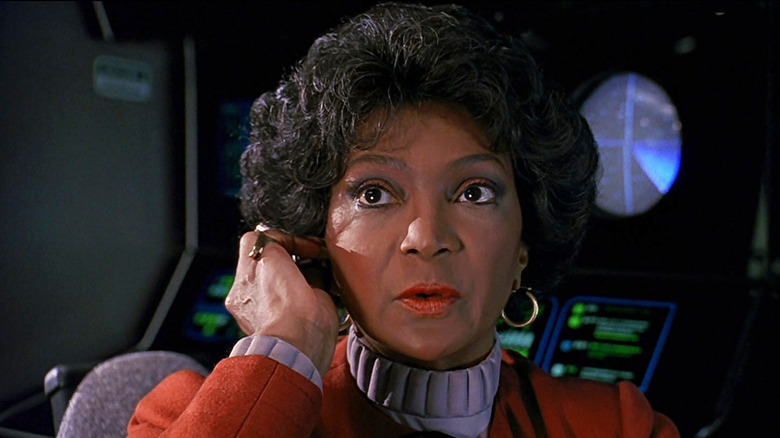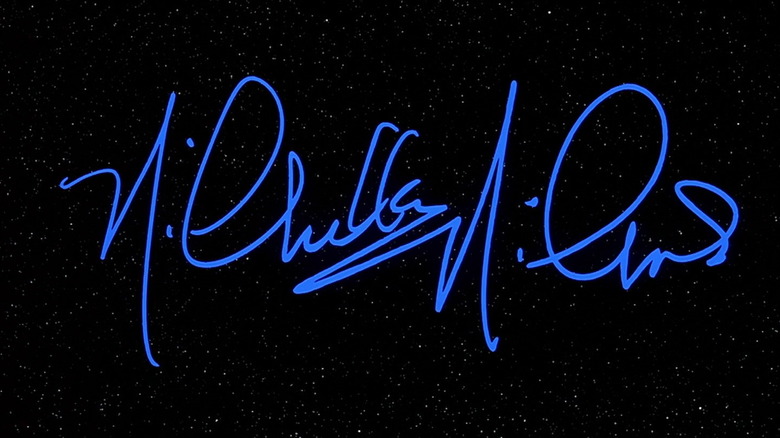Star Trek VI: The Undiscovered Country's Credits Have An Uhura Mistake - Here's Why
We may receive a commission on purchases made from links.
Nicholas Meyer's 1991 film "Star Trek VI: The Undiscovered Country" was a good sendoff for the original cast of "Star Trek." It had been 25 years since "Star Trek" debuted, and the franchise had already found new footing with "Star Trek: The Next Generation," a series that was in its fourth season when "The Undiscovered Country" came out. The film was about the collapse of the Klingon Empire and the beginning of a new era of peace. Naturally, there were secret bad actors afoot who wanted to keep the Cold War between the Federation and the Klingons raging, and the sixth flick in the franchise follows the fallout after an assassination attempt. It's just as much Tom Clancy as it is a space adventure.
The film ended with the U.S.S. Enterprise saving the day, and the crew — Walter Koenig, William Shatner, Leonard Nimoy, DeForest Kelley, George Takei, Nichelle Nichols, and James Doohan — gathered on the bridge to catch their breath. Uhura (Nichols) announces to the bridge that the Enterprise has been ordered back to Starfleet command ... to be decommissioned. Everyone is struck by the weight of the order. This really was the final ride. Spock (Nimoy) then offers that they merely tell Starfleet to go to Hell, and they sail off on their own. Presumably, they weren't apprehended by security or punished for stealing the ship. "Second star to the right, and straight on 'til morning," Kirk says.
Then the credits begin, featuring the on-screen autographs of each of the above seven actors. It's a sweet acknowledgment of the cast. After the autographs, the credits begin to roll, and Trekkies will immediately spot an error, causing a lot of the farewell majesty to come crashing down. Nichelle Nichols is credited as having played "Uhuru." Her character was Commander Nyota Uhura. After 25 years, how did this basic typo make its way onto the big screen?
The answer can be found in the 1997 book "Inside Star Trek: The Real Story" written by Herbert F. Solow and Robert Justman.
Who the heck is 'Uhuru?'
When Gene Roddenberry was still developing "Star Trek" back in 1966, he imagined the communications officer to be a Black woman named Lieutenant Sulu. Solow, who worked on the series as development coordinator, suggested that "Sulu" was too close to "Zulu," and he didn't like the racial implications. Roddenberry heeded Solow's advice and moved the "Sulu" name over to the ship's Japanese helmsman (even though there is no "L" sound in the Japanese language).
In 1962, author Robert Ruark published a book called "Uhuru: A Novel of Africa Today," using the Swahili word for "freedom." Justman, who served as a producer and production designer, was aware of the novel and mentioned it to Roddenberry. When Roddenberry learned what "Uhuru" meant, he repurposed it as "Uhura," and used it as the name for his communications officer.
Of course, the name Uhura was used in 69 episodes of the original "Star Trek" series, in 16 episodes of "Star Trek: The Animated Series," and in five feature films prior to the release of "Star Trek VI: The Undiscovered Country." This is to say nothing of the hundreds of novels and ancillary tie-in merchandise that had the name "Uhura" written all over it. It's not like there had been confusion about the spelling, or which version was considered "official." It was always "Uhura."
It seems that whoever typed out the credits for "Star Trek VI" merely botched their job, as did any editors or proofreaders who stood between that spelling mistake and the big screen. It's unclear if that person was consulting some very, very early production notes from "Star Trek" and saw the wrong name, or if it was a typographical error. Either way, Trekkies now had to witness this little blunder at the tail end of what was supposed to be a celebratory and dignified sendoff. Oh, well.

